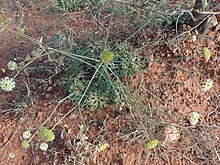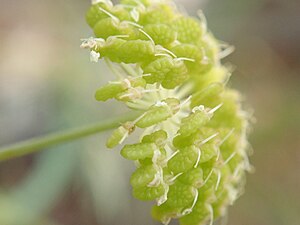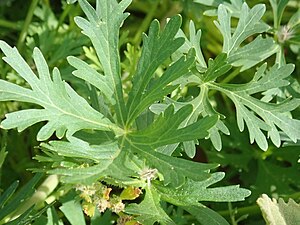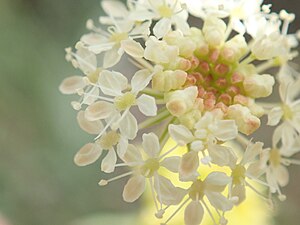Trachymene ochracea
| Trachymene ochracea | |
|---|---|

| |
| Scientific classification | |
| Kingdom: | Plantae |
| Clade: | Tracheophytes |
| Clade: | Angiosperms |
| Clade: | Eudicots |
| Clade: | Asterids |
| Order: | Apiales |
| Family: | Araliaceae |
| Genus: | Trachymene |
| Species: | T. ochracea
|
| Binomial name | |
| Trachymene ochracea | |
Trachymene ochracea (common names white parsnip, wild parsnip, yellow parsnip) is a herb in the family Araliaceae.[3] It is native to Australia and found in New South Wales and Queensland.[3]
Description
[edit]Trachymene ochracea is an erect herb growing up to 75 centimetres (30 in) high. The leaves are consist of 3-5 deeply dissected lobes on stalks (petioles) up to 10 cm long. The inflorescences are umbels borne on dichasial cymes. The umbels have 30 to 60 flowers, are from 7 mm to 18 mm in diameter on stalks (peduncles) which are 3 to 8 cm long and are glandular-hairy near the stalk base. The flowers are bisexual, with white petals (pink in bud). The ovary has two locules.[3]
The plant is prolific after rain, growing in mulga and mallee communities on red earths and on sand.[3]
Taxonomy
[edit]Trachymene ochracea was first described by Lawrence Alexander Sidney Johnson in 1962, from a specimen collected west of the Paroo River, in New South Wales, near Hungerford by J.L. Boorman in October 1912 (NSW 54006).[1][2]
Etymology
[edit]The species epithet, ochracea, is the Latin adjective, ochraceus,-a,-um which means "ovhre-yellow" or "yellowish-brown".[4]
Gallery
[edit]-
Fruit
-
leaves
-
plant
-
flower head
References
[edit]- ^ a b "Trachymene ochracea". Australian Plant Name Index, IBIS database. Centre for Plant Biodiversity Research, Australian Government.
- ^ a b Johnson, L.A.S. (1962). Anderson, R.H. (ed.). "Taxonomic notes on Australian plants". Contributions from the New South Wales National Herbarium. 3 (3): 101.
- ^ a b c d Hart, J.M. (2002). "PlantNET - FloraOnline: Trachymene ochracea". plantnet.rbgsyd.nsw.gov.au. Retrieved 3 July 2020.
- ^ Stearn, W.T. Botanical Latin (4 ed.). Oregon: Timber Press. p. 455. ISBN 9780881926279.
External links
[edit]




